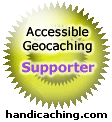When
Dave Ulmer created and placed the first geocache, one of the rules was "take something, leave something". He didn't say so, but it should be implied that when you do trade, you trade equal or better.

I placed a large geocache a little over a year ago. In it I placed about $50 of good, new items. I wanted it to be a very pleasant surprise when they found the "Big Store" of geocache swag. After several months I stopped by to check on the cache and to my surprise the cache had been pilfered. No, everything was not taken, but most of the very good, new items was traded for used McD's toys and plastic army men.
So, I did what any geocache owner would do. I restocked the cache with many new items. Several high quality baseball hats were placed in the cache. Now, these were not the cheap hats, but even if they were, they would be worth $5.00 each!
Another few months went by and I checked on the cache again. PILFERED! I just don't understand it. After examining the logs I surmise the following:
Geocachers are not prepared for trading items. They have their GPSr, camera, cellphone, but not much else. When they arrive at the geocache, they see the nice goodies and decide to "just take one". Also, some geocachers cache in groups. Maybe it is their friends, or maybe children and their friends. When the children see all the goodies, they must have one.
Now understand, I don't blame the children. They are just doing what kids do. The adults are the ones who totally miss a teaching experience. BEFORE going geocaching with the children, the parents/adults should explain to the children what it means to trade fairly. The adults should encourage the children to pick a couple of their own toys that they really like. That way, when they trade, they are trading equal or better. If the adults arrive at the cache with the children and the adult was ill prepared, they should explain to the children what fair trading is and since they didn't bring anything nice to trade, they would have to come back another time when prepared.
But, I think, what really happens is that the privacy of the moment just "excuses" the parents/adults from having to exercise parental responsibility. I know it is difficult to tell a child no, but that's part of parenting! Not teaching a child when not to do something is just doing that child a disservice.
The lesson to learn is that if you go geocaching, be prepared to trade or don't take anything from the geocache. Parents should prepare their children in advance so the geocache is not pilfered. If you find the geocache and are not prepared to trade equal or better, then just sign the log and take nothing.
We all need to take care of the geocaches we visit. Be prepared with trade items, blank logs, paper towels to clean out damp caches, etc. Make sure the experience of the next geocacher is better than yours!
 I got my new Pathtag in the mail today. I am very happy with the results.
I got my new Pathtag in the mail today. I am very happy with the results.









